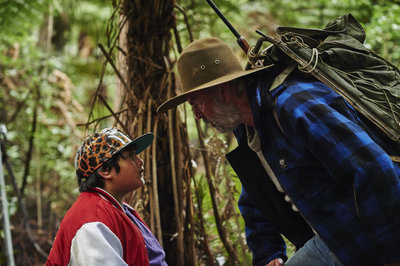
Hunt for the Wilderpeople by Taika Waititi is about an unlikely pair of outcasts who scamper into the New Zealand backcountry to escape the bumbling clutches of a nationwide manhunt. The film is derivative, predictable, grandiose and utterly sentimental.
It is also smart, funny, big-hearted and disarmingly adorable, and it juggles these absurd qualities with dexterity and a winking charm that is almost impossible to deny.
As the movie opens, we are introduced to 12-year-old Ricky Baker (Julian Dennison), an incorrigible (read: indomitable) foster kid being placed with the last family in New Zealand that will give him a shake. Referring to him as a “real bad egg,” social worker Paula (Rachel House) hands Ricky over to the kooky, loving Aunt Bella (Rima Te Wiata), whose husband Hec (Sam Neill) is a grouchy misanthrope who wants nothing to do with the brat.
Just as the members of this makeshift family begin to warm to each other, Bella drops dead, and Ricky, to avoid being reclaimed by Paula, fakes his own death and takes to the hills. Hec tracks him down, but instead of hauling Ricky back to civilization, he succumbs to the kid’s offbeat charms, and the two go on the run, pursued relentlessly by Paula and a bumbling army of cops.
Waititi is a sure-footed and savvy director, dropping various genre elements and pop references into a giddy, romping narrative that sails along on a warm breeze of pure fun. Like the recent Netflix hit Stranger Things, which joyously ravages the closet of ’80s Hollywood blockbusters, Hunt for the Wilderpeople borrows liberally and unashamedly from cinema’s wardrobe — the absurdist storybook formalism of Wes Anderson, the heightened neo-pulp drama and slapstick action of early Spielberg, the lush naturalism and anti-civilizing sentimentality of Peter Weir.
Based on the novel Wild Pork and Watercress by New Zealand author Barry Crump, Hunt for the Wilderpeople is at once a rollicking buddy movie and an unabashed celebration of the outdoors; Hec and Ricky’s flight into the lush bush country is at once literal and symbolic, an escape as well as a shrugging off of the amped-up hypocrisy and hedging control of metropolitan life, perfectly embodied in social worker Paula, whose furious mission to capture these “criminals” rivals Ahab’s monomaniacal pursuit of the white whale.
Ahab’s fate, of course, was tragic, and this movie is anything but tragic, though it’s not without a certain aura of sadness and loss. Beneath the film’s infectiously comic surface beats two hearts struggling to find communion in the common ground of their flawed, damaged humanity. The slow, beleaguered bond formed between Hec and Ricky is as earnest and authentic as the film is campy and over-the-top, and that’s exactly why the whole thing works.
Neill, who has made a career playing weak and vile men, gives a heartbreaking performance that slowly and gruffly reveals the desperate yearning for companionship that smolders behind Hec’s layers of crust and cringe. And as Ricky, Dennison is completely endearing — a sharp, sassy survivor whose spirited rebellion cloaks the vulnerability of a kid who simply wants to belong.
Hunt for the Wilderpeople is cinematic escapism at its best — the sort of generous, fizzy celebration of boon companionship at which Hollywood once excelled but no more. If you’re looking for a break from this season of discontent and despair, look no further than the portly figure of Ricky Baker and his grumpy Uncle Hec. They’re a total hoot.
Opens Friday, Aug. 6, at Broadway Metro.